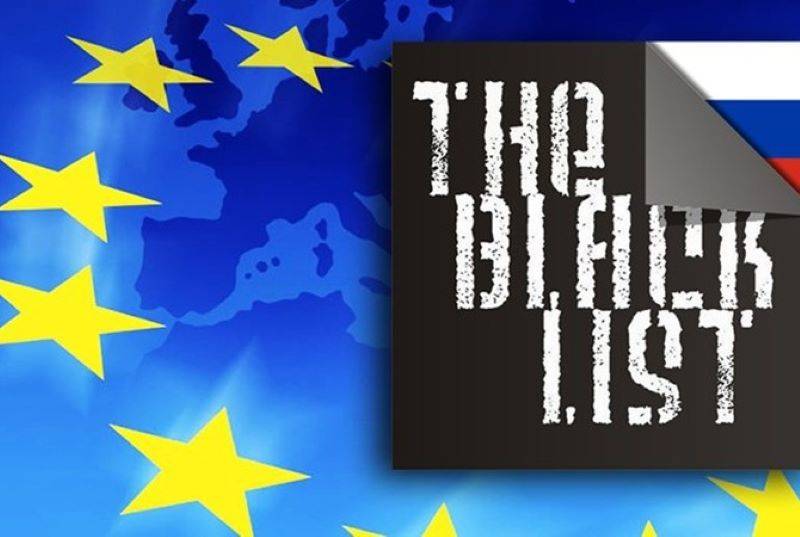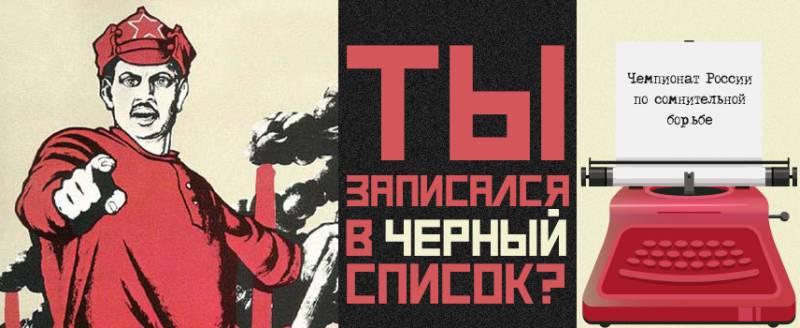And again - blacklists and gray banks
It's your fault ...
The other day, a terrible news - commercial banks began to refuse service to structures that were included in a certain list of the Central Bank, which was immediately called "black". It was not worth expecting otherwise, although the Central Bank repeatedly repeated that the purely informational materials that appear on its network resource are not a guide to action.
However, a commercial bank does not need permission or prohibition from a regulator or even a court to simply refuse to serve a particular client. It is he - the client has the right to challenge the actions of the bank in court, but what can it give in the end?
Colleagues journalists have already accused the bankers, who hastened to “curry favor with the Central Bank,” of preventive punitive practice, but this is unlikely to change anything. This is not the first time we write about various kinds of blacklists (EU blacklist. There are few real violent?) and an unprecedented cleanup of the banking sector (What Financial Intelligence Doesn't Know?).
This policy was carried out with the light hand of the Central Bank of the Russian Federation, or rather, directly by its employees. Moreover, not only through the revocation of licenses, but also through the refusal of one or another credit institution in the possibility of getting into completely different lists - the so-called authorized banks. And also - through reorganization and bankruptcy, which can be considered a direct consequence of not being among the “chosen ones”.
Today, getting into the black list of the Central Bank may be worse than the verdict. After all, this may well be followed by a refusal to issue a license and accounts, the closure of existing accounts in banks and payment systems, and finally, blocking of Internet sites, without which there is nowhere.
Further more - for example, refusal to accept payments in favor of companies from the black list, although so far payment systems do not do this yet. There is nothing to say about damage to reputation and lost profits. And this is only because banks "prefer not to work with persons and structures from the list."
Other lists, other numbers?
Do not think that everyone on the Central Bank's lists has quietly resigned themselves to the future. Complaints and demands to investigate went to the Bank of Russia immediately after publication. And the most surprising thing is that there are already losses in the black lists, and quite significant losses at that.
However, for those who regularly deal with the Central Bank, this is not news. For illustration purposes, let's look at the data of the Commission for Consideration of Complaints on the Central Bank's decisions on recognizing a person as not complying with the qualification requirements or requirements for business reputation.
This data, like the black list, is open and even very fresh - as of July 1 of the current 2021. In total, the commission during its work received 973 appeals from financiers who disagree with various decisions of the Central Bank of the Russian Federation, most of which do not correspond with the June blacklist in any way.
But this is not important, we are interested in trends and statistics, which will almost certainly be similar in the case of the black list. Of the total number of complaints received, 690 were related to the activities of credit institutions. They concerned 159 banks and financial structures without a banking license, and 283 complaints related to the work of 77 non-credit financial institutions.
So, the commission in the end has already satisfied 449 complaints. Of 973, slightly less than half. This is data from a thematic review of the regulator itself - that is, the Central Bank of the Russian Federation. Agree, such surprisingly "soft" statistics cannot but confuse any sane person.
Here either the Central Bank a priori put almost all of its wards under suspicion, or the case is completely unclean. That is, those who are guilty, and now, as you can see, are being blacklisted, quickly "solve" their problems with the Central Bank of the Russian Federation.
It is hard to believe, excuse me, with difficulty that they really prove their innocence at once or quickly adjust all the necessary data indicating the purity of certain financial transactions.

Announce not the entire list
A technical or informational list of companies with signs of illegal activity was published by the Central Bank on June 1. Initially, it consisted of 1800 structures, now their number already exceeds 2000. By no means all of them can be identified by a non-specialist by profile and type of activity.
According to Valery Lyakha, director of the department for countering unfair practices of the Central Bank, the first to be included in the list are “black creditors”, illegal forex dealers and financial pyramids.
On our own behalf, we add that the very place there is also for numerous microcredit organizations, which, as in the dashing 90s, take up to 10 percent a day (and this is 300 per month). In the outback, they grow like mushrooms after rain and just as quickly go nowhere. They only need to get at least a minimal plus, or safely "launder" the ordered amounts.
And this is despite all the countermeasures not only by the Central Bank of the Russian Federation, but also by law enforcement agencies. However, law enforcement officers, in contrast to bankers who are now so actively "go into denials", act, as a rule, in the rearguard of the Bank of Russia, more precisely - usually at its filing.
But with the "filing" of the case, the situation is more complicated - for the initiation of criminal cases, grounds are needed that are stronger than a simple suspicion of illegal activity. In this regard, it is difficult to explain why the notorious list was posted on the website of the Central Bank of the Russian Federation openly. It's good at least that there are no comments, and this is, in fact, logical.
However, many immediately took it as a guide to action. And they began to act. Most likely, not as in the Russian proverb about someone who was forced to pray to God, but simply to avoid risk.
And really - is it worth, in general, to get involved with potential bankrupts or persons under investigation? But quite recently it might have seemed that the punitive practice of the Central Bank of the Russian Federation had come to naught. Firstly, because the “big clean-up” of the banking sector was completed several years ago and there is almost no one to clean up, and secondly, because of the pandemic.
But why did the games with lists - both black and white - coincide so surprisingly with the sharp tightening of the Central Bank's monetary policy? Tell me, how else to consider a XNUMX-fold increase in the key rate? Is there really another cleanup coming, and now not only of banks?

Information